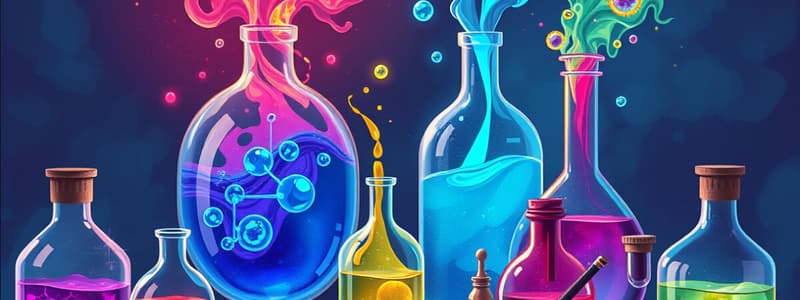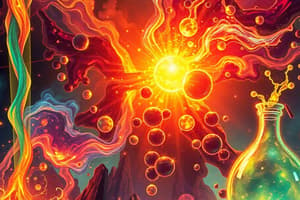Podcast
Questions and Answers
Classify each of the following chemical reactions: S + O2 → SO2, CaCl2 + 2AgNO3 → Ca(NO3)2 + 2AgCl, Zn + CuSO4 → Cu + ZnSO4, 2Na2O → 4Na + O2.
Classify each of the following chemical reactions: S + O2 → SO2, CaCl2 + 2AgNO3 → Ca(NO3)2 + 2AgCl, Zn + CuSO4 → Cu + ZnSO4, 2Na2O → 4Na + O2.
- Decomposition only (correct)
- Synthesis and combustion (correct)
- Single replacement (correct)
- Double replacement (correct)
What is the product of the reaction ? + 2NaBr → 2NaCl + Br2?
What is the product of the reaction ? + 2NaBr → 2NaCl + Br2?
Cl2
What is produced in the decomposition of 2KClO3 → 2KCl + ?
What is produced in the decomposition of 2KClO3 → 2KCl + ?
3O2
In the reaction MgO + ? → Mg(OH)2, what is the missing reactant?
In the reaction MgO + ? → Mg(OH)2, what is the missing reactant?
Will the following reactions take place? Ag + NaNO3 → AgNO3 + Na, Mn + CaO → Ca + MnO, Ca + ZnBr2 → CaBr2 + Zn, Cu + 2KNO3 → Cu(NO3)2 + 2K.
Will the following reactions take place? Ag + NaNO3 → AgNO3 + Na, Mn + CaO → Ca + MnO, Ca + ZnBr2 → CaBr2 + Zn, Cu + 2KNO3 → Cu(NO3)2 + 2K.
Will the following reactions take place? Cl2 + 2RbI → 2RbCl + I2, I2 + NiBr2 → NiI2 + Br2.
Will the following reactions take place? Cl2 + 2RbI → 2RbCl + I2, I2 + NiBr2 → NiI2 + Br2.
Complete the reactions: Na + Cl2 → ?, Mg + Ca(OH)2 → ?.
Complete the reactions: Na + Cl2 → ?, Mg + Ca(OH)2 → ?.
Which products form from the reaction C3H8 + O2 → ?.
Which products form from the reaction C3H8 + O2 → ?.
What products result from the reaction Kl + Pb(NO3)2?
What products result from the reaction Kl + Pb(NO3)2?
What is the type of the reaction where propane burns in air?
What is the type of the reaction where propane burns in air?
What reaction is described when one compound is broken down into simpler compounds?
What reaction is described when one compound is broken down into simpler compounds?
Which reactant combination will form products involving iron? Na > Mg > Al > Mn > Zn > Cr > Fe > Cd > Co > Ni > Sn > Pb > H > Sb > Bi > Cu > Ag.
Which reactant combination will form products involving iron? Na > Mg > Al > Mn > Zn > Cr > Fe > Cd > Co > Ni > Sn > Pb > H > Sb > Bi > Cu > Ag.
What product(s) are typically formed in a combustion reaction?
What product(s) are typically formed in a combustion reaction?
What products are formed when chlorine gas is bubbled through sodium bromide solution?
What products are formed when chlorine gas is bubbled through sodium bromide solution?
What describes a double replacement reaction?
What describes a double replacement reaction?
What products are formed when aluminum is added to a silver chloride solution?
What products are formed when aluminum is added to a silver chloride solution?
In which type of reaction do two or more substances combine to form one substance?
In which type of reaction do two or more substances combine to form one substance?
What type of reaction occurs with two elements as reactants?
What type of reaction occurs with two elements as reactants?
What completes the equation: Br2 + NaF?
What completes the equation: Br2 + NaF?
What type of reaction is represented by C6H12 + 9O2 → 6CO2 + 6H2O?
What type of reaction is represented by C6H12 + 9O2 → 6CO2 + 6H2O?
Which is a characteristic of a decomposition reaction?
Which is a characteristic of a decomposition reaction?
What type of reaction is represented by sodium chloride reacting with copper sulfate?
What type of reaction is represented by sodium chloride reacting with copper sulfate?
Flashcards are hidden until you start studying
Study Notes
Types of Reactions
- Synthesis Reaction: Formation of a product from two or more reactants, e.g., S + O2 → SO2.
- Combustion Reaction: Reaction with oxygen producing carbon dioxide and water, exemplified by propane combustion (C3H8 + O2 → CO2 + H2O).
- Double Replacement Reaction: Exchange of ions between two compounds, such as CaCl2 + 2AgNO3 → Ca(NO3)2 + 2AgCl.
- Single Replacement Reaction: One element replaces another in a compound, e.g., Zn + CuSO4 → Cu + ZnSO4.
- Decomposition Reaction: Breaking down of a compound into simpler substances, e.g., 2Na2O → 4Na + O2.
Activity Series
- Reactivity can predict reaction outcomes; metals higher in the series can displace those lower.
- Example:
- Ag + NaNO3 → No reaction (Ag is less reactive than Na).
- Mn + CaO → No reaction (Mn is less reactive than Ca).
- Ca + ZnBr2 → Yes, reaction occurs (Ca is more reactive than Zn).
- Cu + 2KNO3 → No reaction (Cu is less reactive than K).
Predicting Products
- Complete and balance chemical equations based on reactants:
- Na + Cl2 → NaCl.
- Cl2 + 2RbI → 2RbCl + I2 shows halogen displacement.
- Recognizing when no reaction occurs is critical, such as Na + Cl2 resulting in NaCl without other products.
Products of Reactions
- Combustion Products: Typically result in oxides, confirming the nature of combustion as producing CO2 and H2O.
- Double Replacement Products: Form ionic compounds by exchanging ions, like KBr with AgNO3 forming KNO3 and PbI2.
Specific Reaction Outcomes
- Chlorine gas with sodium bromide forms NaCl and Br2 through halogen displacement.
- Aluminum reacts with silver chloride to yield AlCl3 and Ag, showcasing a single replacement reaction.
Reaction Characteristics
- Decomposition reactions involve breaking down a compound into simpler parts, exemplified by XYZ breaking down into X, Y, and Z.
- Synthesis and Decomposition: Key reactions to recognize; synthesis combines elements, while decomposition separates them.
Reaction Types Review
- Single Replacement: A + BC → AC + B; example: Zn displaces Cu in a sulfate solution.
- Double Replacement: AB + CD → AD + CB; such as NaCl reacting with CuSO4 to yield products.
- Combustion Reaction Identification: Look for reactants combining with oxygen and producing CO2 and water.
Summary and Application
- Understanding reaction types aids in predicting outcomes and completing equations.
- Familiarizing with activity series enhances precision in determining reactivity and potential reactions between elements and compounds.
- Recognizing common products and characteristics of each reaction type is critical for mastering chemical reactions.
Studying That Suits You
Use AI to generate personalized quizzes and flashcards to suit your learning preferences.




